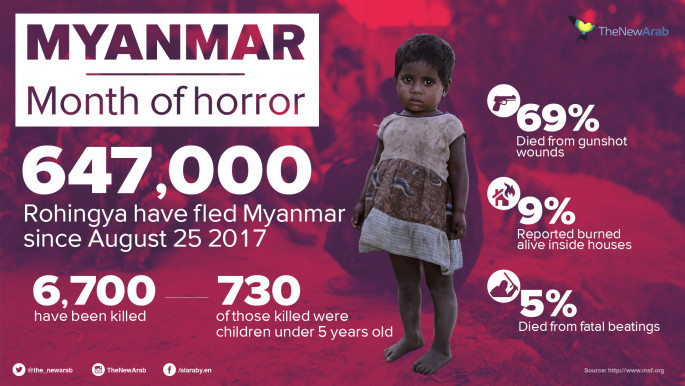Rohingya holding out for an end to Myanmar's abuses
Rohingya holding out for an end to Myanmar's abuses
While hundreds of thousands of persecuted Rohingya Muslims have fled Myanmar, others have decided to stay in a country they have considered their homeland for centuries, writes Austin Bodetti.
4 min read
At least 647,000 Rohingya have fled to Bangladesh since August [Getty]
The Rohingya, Myanmar's largest Muslim ethnic group, face persecution unlike even that faced by their counterparts in the Philippines and Thailand.
The Tatmadaw, the Buddhist-majority country's military, has persecuted the Rohingya for decades. In October 2016, Rohingya insurgents tried to start a revolution by killing nine policemen, followed by another attack in August 2017.
In response, the Tatmadaw has initiated a campaign of ethnic cleansing that threatens to erase the Rohingya from Myanmar, a country with a long history of oppressing minority ethnicities and religions.
According to human rights groups, more than 500,000 Rohingya have fled to Bangladesh in the wake of the Tatmadaw's year-long crackdown.
Others, however, have decided to stay in a country that they, like their Buddhist compatriots, have considered their homeland for centuries. They reside in a region that the Myanma government calls "Rakhine State" but they refer to as "Arakan".
"The Rohingya who remain in Arakan don't want to leave their motherland," a Rohingya who requested anonymity for his safety told The New Arab, citing concerns that the Tatmadaw could target him or his family in its ongoing operations in Rakhine State.
"For example, if a cobra bites one member of your family, the whole family won't leave the house. Only if a cobra bites every single member of your family will everyone leave. No one wants to leave his home for good."
 |
The Rohingya who remain in Arakan don't want to leave their motherland |  |
Describing the insurgents as "terrorists", Myanmar has arrested, burned, displaced, executed, raped, and tortured Rohingya civilians.
Drawing on the narrative provided by the War on Terror, the Tatmadaw has built several anti-Rohingya justifications for what critics say amounts to a campaign of state terrorism.
But the efforts of the generals who have long governed Myanmar behind the scenes to encourage the Rohingya to leave the country predate the 2016–7 campaign by several years.
Back in 2012, the Tatmadaw jailed tens of thousands of Rohingya in concentration camps after anti-Muslim riots exploded in Sittwe, capital of Rakhine State.
The Myanma government ignored the objections of Human Rights Watch and the United Nations, referencing concerns about terrorism then, as it has now.
Some human rights defenders hoped that Aung San Suu Kyi, a former political prisoner elected State Counselor of Myanmar in 2015, would defend the Rohingya and limit the Tatmadaw's excesses.
Instead, she has disputed the international community's criticism of Myanmar in an attempt to protect not the Rohingya but the Tatmadaw.
In any case, she in fact has no control over the Tatmadaw, which has governed Myanmar as a military dictatorship in one way or another for decades.
 |
Hundreds of thousands still remain in Rakhine State, trying to withstand what the Tatmadaw portrays as an exercise in counterinsurgency and counterterrorism |  |
Hundreds of thousands still remain in Rakhine State, trying to withstand what the Tatmadaw portrays as an exercise in counterinsurgency and counterterrorism.
"We are all human," the same Rohingya told The New Arab. "No human on Earth wants to leave the soil of his native land without a very good reason for doing so."
As the extent of the Rohingya's persecution has grown, so has the range of their international allies. In November, United States Secretary of State Rex Tillerson pressed the Myanma government to investigate abuses against the Rohingya.
The same month, Pope Francis urged the Tatmadaw to respect human rights on his visit to Myanmar. Even al-Qaeda and the Islamic State group have found themselves in rare agreement with the US and the Vatican, expressing concern for the plight of the Rohingya and offering to support them.
For its part, the Tatmadaw seems to have little interest in the thoughts of other countries or foreign militants.
Whereas the Philippine and Thai governments, which are fighting their own Islamist insurgencies in Mindanao and Patani, have voiced interest in peace talks with rebels, the Myanma government has rejected negotiations with Rohingya insurgents, citing the cliché: "We don't negotiate with terrorists."
In truth, the Tatmadaw has no reason to, for the Rohingya have no leverage.
Unlike rebels in Patani and Mindanao, they lack the weaponry and sophistication necessary for military victory.
As the news media turns to humanitarian crises in Libya and Yemen, two countries far closer to the Western world than Myanmar, the suffering of the Rohingya worsens.
Reports on the Tatmadaw employing gang rape and targeting Rohingya children are growing. So, however, are op-eds calling for humanitarian intervention by the West.
Now that the UN Human Rights Council and the US House of Representatives have voiced their opinions, the Rohingya may have enough international allies to begin planning their future once more.

Austin Bodetti is a freelance journalist focusing on conflict in the greater Middle East and a student in the Gabelli Presidential Scholars Programme at Boston College majoring in Islamic Civilisation and Societies and studying Arabic and Persian. He has reported from Indonesia, Iraq, Myanmar, South Sudan and Thailand, and his writing has appeared in Motherboard, The Daily Beast, USA Today, Vox, Wired, and Yahoo News.
![Rohingya [Getty] Rohingya [Getty]](/sites/default/files/styles/image_345x195/public/media/images/37515486-9693-429C-A690-ABFD4B322EDA.jpg?h=d1cb525d&itok=WQ5YKesP)


